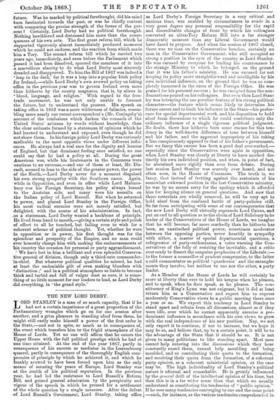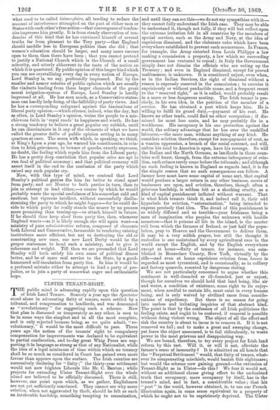THE NEW LORD DERBY.
LORD STANLEY is a man of so much capacity, that if he had not a certain impatience of a great proportion of the Parliamentary wrangles which go on for one session after another, and a grim pleasure in standing aloof from them, he might still easily make himself a power of the first order in the State,—and not in spite, so much as in consequence of, the event which transfers him to the frigid atmosphere of the 'House of Lords. Yet no one will affirm that he enters the Upper House with the full political prestige which he had at one time attained. At the end of the year 1867, partly in 'consequence of his success as mediator in the Luxembourg 'quarrel, partly in consequence of the thoroughly English com- promise of principle by which he achieved it, and which he -frankly avowed to have been forced upon him as the only -means of securing the peace of Europe, Lord Stanley was at the zenith of his political reputation. In the previous year, he had led the resistance to Lord Russell's Reform Bill, and gained general admiration by the perspicuity and -vigour of the speech in which he pressed for a settlement of the whole question by a single measure. After the defeat of Lord Russell's Government, Lord Stanley, taking office as Lord Derby's Foreign Secretary in a very critical and anxious time, was enabled by circumstances to evade in a very great degree any personal responsibility for the rapid and discreditable changes of front by which his colleagues converted an ultra-Tory Reform Bill into a far stronger democratic measure than any Liberal Government would have dared to propose. And when the session of 1867 closed, there was no man on the Conservative benches, certainly no man in the Conservative Government, who still occupied so strong a position in the eyes of the country as Lord Stanley. He was excused by everyone for lending his countenance to the strange Ministry to which he belonged, on the ground that it was his father's ministry. He was excused for not keeping its policy more straightforward and intelligible by his own individual influence, on the ground that he was so com- pletely immersed in the cares of the Foreign Office. He was praised for his personal success ; he was excepted from the con- demnations poured on his colleagues. But even then Lord Stan- ley was betraying the one peculiar feature of his strong political character—the feature which seems likely to determine his future career and to limit his influence in the State—his prefer- ence for special departmental work, and his disposition to hold aloof from discussions to which he could contribute only the ordinary influence of a single vigorous political judgment. No doubt, there has hitherto been some excuse for this ten- dency in the well-known difference of tone between himself and his father, and the apparent impropriety of his taking a line conspicuously opposed to that of his father's government. But we fancy this excuse has been a good deal overworked,— especially since the Conservatives were again in opposition, when Lord Stanley was clearly at liberty to have marked dis- tinctly his own individual position, and when, in point of fact, he abstained more rigidly than ever from debate. During last session Lord Stanley was scarcely ever heard, and not often seen, in the House of Commons. The truth is, we fancy, that instead of fretting against the restraints of his somewhat awkward position in the last Conservative ministry, he was by no means sorry for the apology which it afforded him for keeping silence on general questions. And now that those restraints are wholly removed, he will be very apt to hold aloof from the confused battle of party-policies still. So far from anticipating with some of our contemporaries that the new Lord Derby will virtually supersede Lord Cairns, and put an end to all question as to the claim of Lord Salisbury to be leader of the Conservatives of the House of Lords, we imagine that he will become, far more markedly than he hitherto has been, an unattached political power, sometimes moderator between the opposing parties, never heartily in sympathy with either, a master of special departmental questions, a refrigerator of party-enthusiasms, a voice warning the Con- servatives of the folly of resisting the inevitable, and a critic ever ready to dissect the sanguine prophecies of the Liberals ;- to the former a counsellor of prudent compromise, to the latter a cold commentator on political quackeries ' and the entangle- ments they involve, but neither to one nor the other, a party leader.
As a Member of the House of Lords he will certainly be more at liberty than ever to hold his tongue when he pleases, and to speak, when he does speak, as he pleases. The con- stituency of King's Lynn was not exigeant, but it did at least return him as a Conservative and expect him to express moderately Conservative views to a public meeting there once a year or so. We expect this tendency in Lord Stanley to stand apart and refrain from all discussions, almost as if they were idle, over which he cannot apparently exercise a pre- dominant influence in accordance with his own views, to grow with the real independence of his new position. Nay, we not only expect it to continue, if not to increase, but we hope it may be so, and believe that, up to a certain point, it will be to the advantage of the State that it should be so. It is not given to many politicians to like standing apart. Most men cannot help entering into the discussions which they hear constantly round them, cannot help moulding and being moulded, and so contributing their quota to the formation, and receiving their quota from the formation, of a coherent party opinion, or a coherent ministerial opinion, as the case may be. The high individuality of Lord Stanley's political nature is unusual and remarkable. He is greatly influenced by the general drift of the intellectual opinion of his time, but then this is in a far wider sense than that which we usually understand as constituting the tendencies of " public opinion." If he sees many tendencies converging to one and the same point —such, for instance, as the various tendencies comprehended in what used to be called laissez-faire, all tending to reduce the amount of interference attempted on the part of either men or States with each other's free action—that convergence of tenden- cies impresses him greatly. It is from steady observation of ten- dencies of this kind that he has convinced himself of several truths far from pleasant to the Tory party—that England should meddle less in European politics than she did ; that women's education should be larger, and many more careers open to them than there have been ; that you cannot pretend to justify a National Church which is the Church of a small minority, and utterly abhorrent to the taste of the nation on which it is quartered. By public opinion of this larger kind which you can see crystallizing every day in every nation of Europe, Lord Stanley is, we say, profoundly impressed. But by the smaller and nearer coteries of public opinion which are usually the viaducts leading from these larger channels of the great moral irrigation-system of Europe, Lord Stanley is hardly impressed at all. He has seen much, as a Conservative states- man can hardly help doing, of the fallibility of party views. And he has a corresponding safeguard against the fascinations of liberal party opinion,—which oftener, indeed, wins the day, but as often, in Lord Stanley's opinion, trains the people to a mis- chievous faith in 'royal roads' to happiness and worth. He has a strong tendency to believe a great popular cry rubbish, until he can discriminate in it any of the elements of what we have called the greater drifts of public opinion setting in in many quarters at once. The scorn with which, in speaking, we think, at King's Lynn a year ago, he warned his constituents, in rela- tion to Irish grievances, to beware of quacks; exactly expresses, no doubt, the feeling which repels him from the Liberal party. He has a pretty deep conviction that popular cries are apt to run foul of political economy ; and that political economy will assert itself in the end to the confusion of the party which raised any such popular cry.
Now, with this type of mind, we contend that Lord Stanley's political genius fits him far better to stand apart from party, and act Mentor to both parties in turn, than to join or attempt to lead either,—a course by which he would probably waste the special usefulness of his somewhat cold and cautious, but vigorous intellect, without successfully disillu- sionizing the party to which he might happen—for he could de- cide to which party he really stands the nearer by no process more promising than tossing-up—to attach himself in future. If he should thus keep aloof from party ties, then, whenever England wants—as it is likely enough she will again want—a ministry of pure administrative reform, composed of elements both Liberal and Conservative, favourable to rendering existing institutions more efficient, but not to destroying the old or constructing new ones, our new Lord Derby would be the proper statesman to head such a ministry, and to give it coherence and weight. Till then we are persuaded that Lord Stanley will both satisfy his own sense of political fitness better, and be of more real service to the State, by a good- humoured self-insulation from party ties. In him it would be a profound mistake either to attempt to lead a party of pre- judice, or to join a party of somewhat eager and enthusiastic hope.































 Previous page
Previous page